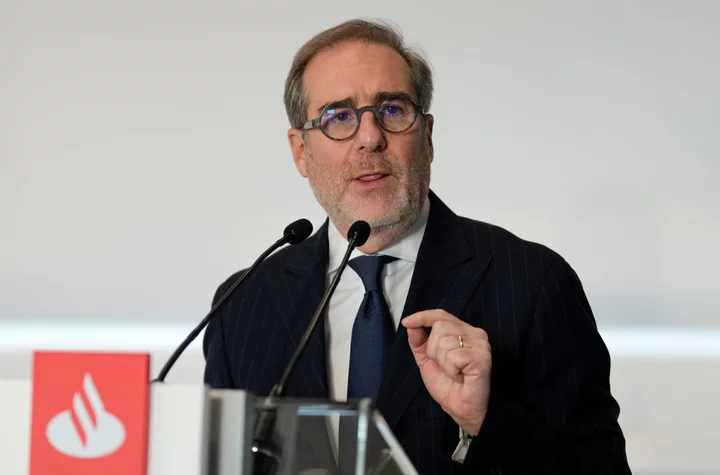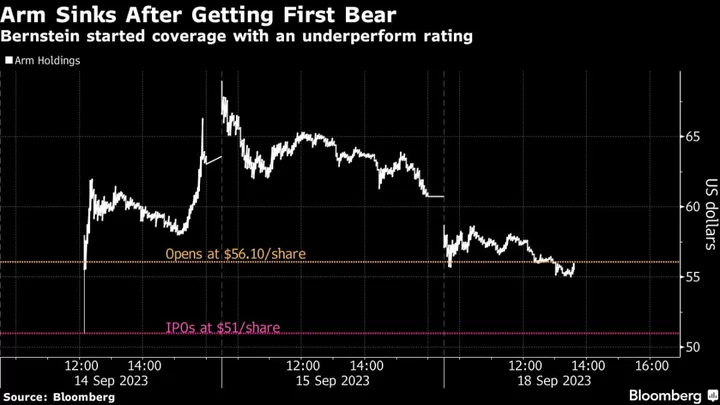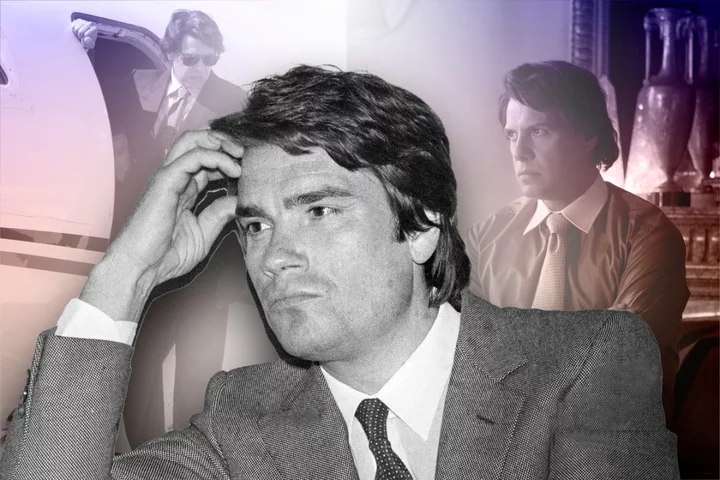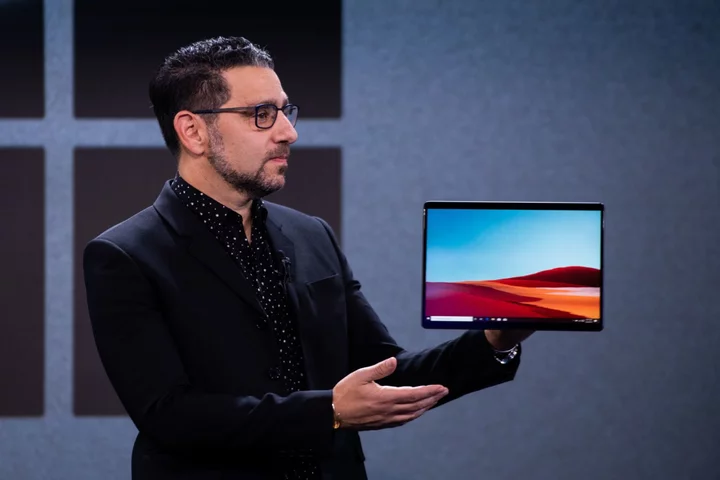
Santander Is Planning a Major Overhaul of Reporting Structure
Banco Santander SA overhauled its corporate structure as Chief Executive Officer Hector Grisi seeks to simplify the company’s
1970-01-01 08:00

Peak Oil Demand ‘Wilting Under Scrutiny,’ Aramco CEO Says
Saudi Aramco Chief Executive Officer Amin Nasser said even though his company’s global oil consumption forecasts have been
1970-01-01 08:00

Jury rejects lawsuit after police fatally shoot man when going to wrong house
A federal court jury in Oxford, Mississippi, has ruled against a civil lawsuit filed by the widow of a man who was shot dead in 2017 by two police officers, while serving a warrant at the wrong address. Claudia Linares was seeking $20m in compensation for the death of her husband Ismael Lopez, 41. During the four-day trial that concluded on Thursday 15 September, the jury ruled that Southaven officers, Zachary Durden and Samuel Maze, did not violate Lopez’s civil rights. “The verdict was that the jurors did not believe that the use of force used by Officers Durden and Maze was excessive in light of all the facts that they considered,” Murray Wells, the attorney for Lopez’s family, said in a statement to WREG-TV. The case had previously attracted attention because the city tried to argue that Lopez did not have any civil rights as he was living illegally in the US and was facing deportation and criminal charges for the illegal possession of firearms. However, in 2020, a judge rejected the city’s claim, and ruled that constitutional rights apply to “all persons.” The Mississippi Bureau of Investigation reported that on 14 July 2017, Lopez and his wife were in bed when officers knocked on their door with the intention of serving a domestic violence warrant to a person who actually lived across the street. According to Mr Durden and Mr Maze, the pair did not identify themselves, and when the door opened, Lopez’s dog ran out and he pointed a rifle through the door. Officer Maze then shot the dog and Mr Durden fired multiple bullets at Lopez. He died after a bullet hit the back of his skull when he was six feet from his front door. Police have claimed he was running away from law enforcement, and a third office later told investigators that Mr Durden had ordered Lopez to drop his rifle several times before shooting him. Lopez’s lawyers stated in their argument that his fingerprints and DNA were not found on the rifle supposedly used to fire at Mr Durden, but believe the officer shot him in reaction to his colleague shooting the dog. They also called upon evidence that state investigators found his body lying in a prone position with his hands cuffed behind his back. There is no video footage to corroborate either claim. “Those officers used tactical maneuvers to hide themselves as police officers,” Mr Wells told WREG. “There are a couple of huge factors at play. One was this unbelievable mistake of going to the wrong address and we felt it was just incompetent because they didn’t even take the time to look at the boxes. They went to the wrong side of the road, so that started this. They never announced that they were police and at the end of the day Ismael Lopez was shot through a door, in the back of the head,” he said. Darren Musselwhite, mayor of Southhaven, praised the jury’s decision: “This verdict proves what we’ve believed to be correct since day one as our officers responded appropriately considering the circumstance of being threatened with deadly force,” he said. “We’ve stood behind them during the last six years for this very reason and, for their sake, are glad this trial is over.” Read More Police officer who fatally shot motorist charged with murder Philadelphia officer to be fired over shooting death of Black man as new video contradicts police account A Utah man was killed during a police traffic stop. His family say they’ve been ‘stonewalled’ by authorities
1970-01-01 08:00

Arm Falls After Bernstein Downplays Company’s AI Prospects
Arm Holdings Plc shares fell on Monday after Bernstein started coverage on the newly public chip designer with
1970-01-01 08:00

Biggest US Pension’s Investment Boss Pushed Sports Deals Before Calling It Quits
In her first year atop the California Public Employees’ Retirement System as chief investment officer, Nicole Musicco gathered
1970-01-01 08:00

‘Very rich, very famous, and very powerful’: How Bernard Tapie became France’s first tycoon – and wound up in prison
If you’ve grown up in France, Bernard Tapie is one of those people you’ve always been aware of, without being able to remember when you first heard about them, or what they’re currently famous for. In Tapie’s case, the answer varied throughout the years: at times, he was famous for his career as a businessman; at others, for his career in the world of sports. There was also politics, show business, and legal scandals, depending on when you asked. Only one constant remained: from his rise to fame in the 1980s to his death in 2021, Tapie was notorious. A new Netflix series dramatizes 30 years of his life, charting his humble beginnings, his not-so-humble early successes, and the biggest legal controversy of his life—for fixing a soccer game in favour of Olympique de Marseille, Marseille’s soccer team, which he then owned. In France, the show is simply called Tapie—a name known to virtually anyone. In the US, it’s titled Class Act, an apparent wordplay to nod both to Tapie’s exceptional destiny and to his status as what sociologist Pierre Bourdieu called a “transfuge de classe”—someone who moves from one social milieu to another. The show, comprising seven episodes, is a fascinating examination not just of the man himself, but of the country that allowed his ascent. It casts an eye back on the lionized men of the 1980s and asks: at what cost did we create them? And what are we meant to do with them now? “In the same way that there was Trump in the US, Berlusconi in Italy, there was Tapie in France,” Tristan Séguéla, who directed and co-wrote the series, tells The Independent in a video call. “The 1980s had a strong mythology around these characters who could embody everything, and who were very rich, very famous, and very powerful all at once.” Bernard Tapie was born in 1943 in Paris. His father was a laborer, his mother a nurse’s aide. He first sought fame as a performer, then in business. In the 1960s, he won a televised singing contest under the name Bernard Tapy—a much more American-seeming spelling of his last name. But that success was short-lived, and Tapie soon transitioned to selling televisions for a living. In the late 1970s and through the 1980s, he became known for purchasing companies on the verge of bankruptcy and reselling them for considerable profit. In the 1990s, he entered politics, as a member of President François Mitterrand’s government and as a Congressman. That same decade, he bought and sold the athletic apparel brand Adidas. The 1990s also saw Tapie’s biggest legal controversy: in 1995, Tapie was sentenced to eight months in prison for bribing members of the opposite team to ensure Marseille’s victory in a final match against Valenciennes. (Tapie had become the president of the Marseille team in 1986.) All of those events are depicted in Tapie. In real life, the story goes on, with more legal troubles (Tapie was sentenced to six months in prison for tax fraud in 1996) and more reinventions. To go through Tapie’s biography is to go through the story of a man who never retreated into anonymity and never stopped believing that the system would, in one way or another, bail him out. In the late 1990s and 2000s, he turned to acting and TV host gigs. In the 2010s, he became the owner of a media company. Tapie was diagnosed with stomach and esophagus cancer in 2017. He died of the disease in October 2021, aged 78. The actor Laurent Lafitte, who brilliantly portrays Tapie in the Netflix series and developed it with Séguéla, has spent time pondering Tapie’s story and what it represents. Tapie, he says in a phone call, was “a kid from the suburbs” raised in part by a Communist father. He views Tapie in that way in opposition to Trump, who long claimed to have received a “small” $1m loan from his father, “as if that were $10”, Lafitte says. Not only that, but that number is substantially false; Fred Trump’s financial support of his sum extended far beyond that sum. Tapie “did not have the same starting point as Trump at all”, Lafitte says, which, in his view, renders Tapie’s boundless ambition more palatable. But he is clear about Tapie’s “ultra liberalism”, and the way capitalism enabled his ascent: Tapie “bought failing companies and brought them back to financial health without concerning himself for the employees’ social wellbeing,” he says. Back in the 1980s, Tapie’s open ambition was considered “novel in France, where we have a rather discreet, reserved rapport with success, and especially with money.” In Tapie, Lafitte says, “we had someone who brandished material success as an absolute accomplishment.” The French language sometimes borrows words from English wholesale, not bothering to come up with a translation. “Fun”, for example, does not have a French equivalent. French people simply say “fun” with a French accent and carry on as usual. “Weekend” is another example. The words used to describe Tapie at various points in his career, Lafitte points out, do not have equivalents in French—there is no French word for “tycoon”, “self-made man”, or even “success story” (if one chooses to see Tapie that way). “These are English words that represent a kind of ultra liberal success that wouldn’t have been shocking for Americans, nor perhaps for some British people, back in the days,” Lafitte says. “But in France, it was really new.” Each episode of Tapie, the series, opens with a disclaimer that states the show is “inspired by real facts”, namely the big parts of Tapie’s life that were already known to the public. The show then takes liberties, imagining various scenes, giving viewers an interpretation of Tapie’s life rather than a date-by-date account. “Fiction worked [in the show] in the service of reality,” says screenwrite Olivier Demangel in a video call. He cites the German philosopher Theodor W Adorno, who, in reference to the works of Honoré de Balzac, wrote about “realism by way of losing reality.” “To me, that’s exactly it,” Demangel says. “[Adorno] was talking about Balzac, but we’ve always thought that Tapie had something of a Balzac character.” Not that the show is entirely disconnected from reality. To research the show, the team read around 40 books, Demangel says, and dug into television archives. “We really worked on the idea that Tapie was kind of the embodiment of television,” Demangel says. “Like a TV salesman who wanted to get inside the machine, and who sort of became television. We realized that he went through every television format, and that he had his downfall at the same time the world moved on to the internet. It’s as though the internet killed the world and Tapie.” Séguéla brought another real-world perspective: his father, Jacques Séguéla, was a prominent French publicist, and a friend of Tapie’s. The younger Séguéla has childhood memories of Tapie spending part of his vacations at the Séguélas’ house. “I remember someone who attracted attention,” he says. “And [Tapie] had one quality—I think it’s the same way with the friends of everyone’s parents: There are those who pay attention to kids, and those who don’t notice them. [Tapie] treated everyone equally, adults and children. I liked that, especially since he was already a media monster by the time he came by. I’d see him on TV, and then I’d see him make paella for everyone. And sometimes, we’d quarrel, too. He would argue with me about a bit of the Tour de France, or soccer teams. I liked that too.” Despite this personal connection, Tapie, before his death, had voiced his opposition to the series. More recently, his family voiced their objections, too. But that was never a problem for Séguéla, nor Lafitte, nor Demangel. They were determined to write the show, and they didn’t particularly want Tapie or his relatives to contribute to the writing. Years ago, Séguéla made it clear to Tapie that he wasn’t seeking his permission to go ahead, Tapie “left him alone” and let him work in peace, Séguéla says. “It would have annoyed me if he’d felt hurt by the show, if he’d found it insulting or defamatory,” Lafitte says. “But I was comforted by the fact that our work was mainly impartial.” Despite the differences between Trump and Tapie, the team too had Trump on the mind while crafting the show. “I would even say that Tapie must have had Trump on his mind during his own rise to fame,” Séguéla says. Tapie, Séguéla points out, published a nonfiction book called Gagner (“to win”), a cross between a memoir and a book of business tips. Tapie’s book came out in 1986. Trump’s own book, The Art of the Deal, came out in 1987—three years after Trump appeared on the cover of GQ. The 1984 cover story was titled: “Success: How Sweet It Is. Men Who Take Risks and Make Millions.” Now, Lafitte struggles to imagine France’s other wealthy men, such as businessmen François-Henri Pinault or Bernard Arnault sing on TV or host a show—both things Tapie did. Still, Tapie’s story as told in the Netflix series seems inseparable from France itself. In Tapie’s tale, Lafitte sees “all the contradictions” of the country’s attitudes to success. “In France, we always tend to be wary of people who succeed materially,” he says. “[Tapie’s story] is the story of a time when the line became a bit more blurry, between [the traditional French mindset] and a more American mindset. He understood that very quickly.” Read More Like Harry, they wrote brutally honest memoirs about their families. What happened next? From Harry Styles to Emma Roberts: How celebrity readers became the book influencers we didn’t know we needed Slim Aarons started out photographing war – but his greatest assignment was in the trenches of fashion Hurricane Nigel expected to ‘rapidly intensify’ by Tuesday - latest Trump says he doesn’t worry about jail risk as he refuses to rule out self-pardon Front door of home where Sharon Tate was murdered sells for $127k
1970-01-01 08:00

Ukraine sues EU neighbours over food imports ban
Kyiv says Slovakia, Poland and Hungary act illegally - but they say they need to protect their farmers.
1970-01-01 08:00

Amazon Is Poised to Hire Departing Microsoft Product Chief
Amazon.com Inc. is hiring Microsoft Corp.’s product chief to run the division responsible for Alexa and the Echo
1970-01-01 08:00

How Ukraine’s battle for the Black Sea is inflicting serious pain on Putin’s forces
Russian warships patrol the surface of the Black Sea, launvhing missiles at Ukrainian cities and towns as part of a near-daily assault. While also enforcing a de-facto blockade, leaving ships in little doubt of he consequences if they try to break it. Such is the importance of this shipping route for both sides. For along time Russian ships moved with relative impunity. And a grain deal that alllowed Ukraine to export from its ports on the Black Sea allowed for an uneasy status quo to hold. But after Moscow withdrew from that deal in the summer and stepped up attacks on Ukraine’s ports, and Kyiv began a counteroffensive to retake land occupied by Russia in sourthern and eastern Ukraine – the Black Sea has become one of the most active fronts in the war. For weeks, Kyiv has been sending a new class of sea drone – essentially unmanned speed boats packed with explosives that can travel many miles – seeking to create havoc and disrupt as much of Moscow’s war machine as it can to help the forces on land. The boats can reach speeds of up to 50mph and can carry a payload of explosives of up to 300 kilograms, according to reports. It is the type of innovative warfare that Kyiv has repeatedly used to push back against a far larger military force. These sea drones have been backed up by missile strikes, including using long-range Storm Shadow missiles from the UK. The most recent scalp? What is believed to be the largest Ukrainian attack on the headquarters of Russia’s Black Sea fleet since the start of Vladimir Putin’s invasion. Kyiv said that the attack on the base in the city of Sevastopol in Russian-occupied Crimea struck a submarine – which analysts suggested was likely a Kilo-class attack submarine that can launch cruise missiles of its own – and a landing vessel. It is thought that this is the first documented successful attack against a Russian submarine during Moscow’s 18-month war. Before that, Ukrainian special forces regained control of a number of oil and gas drilling platforms that Russia has used to help control the Black Sea in a “unique operation”, the country’s military intelligence (GUR) said. The UK’s Ministry of Defence has previously said the platforms could be used to launch helicopters, position long-range missile systems and as a base for forward deployment. ”Russia has been deprived of the ability to fully control the waters of the Black Sea, and this makes Ukraine many steps closer to regaining Crimea,” the GUR said. Meanwhile, two commercial ships have docked at a Ukrainian port in recent days as Kyiv steps up efforts to unilaterally break Russia’s blockade, using a corridor hugging the Black Sea coast of its southern neighbours and Nato members Romania and Bulgaria. Keir Giles, a senior consulting fellow of the Russia and Eurasia Programme at the Chatham House think tank, said the focus on the Black Sea by Ukrainian forces was a “relative change” and they aren’t “abandoning things they are doing on the front line in the east.” He said: “There are more noticeable things happening now that operations against Crimea are picking up pace. But that’s after a long period of preparation. “We saw earlier the attacks by missiles and special forces landing to reduce Russia’s air defence capability in Crimea and now as a result of that they [Ukrainian forces] can carry out those other operations that rely on those air defences being ineffective. “And that’s why we’re seeing this uptick in the pace... It’s also part of the process of eroding Russia’s sustainability of its hold on Crimea... making it so it will eventually be untenable.” As well as the strategic importance of the Black Sea, there is a symbolic element that can prove a powerful tool. Russia’s annexation of Crimea in 2014 is soemthign that Kyiv has been seeking to avenge for a long time. Hence the talk from Ukrainian officials about the retaking of Crimea being a long term goal (as well as the rest of the territory Russia has occupied during its current invasion). For Russia – and Putin in particular – there is also deep sumbolism in Crimea and the Black Sea. “It is a means by which they can throttle Ukraine, throttle its economy. As soon as they seized Crimea in 2014 it immediately compromised Ukraine’s ability to be able to trade and access the Black Sea from all of its eastern ports,” Giles says. “So from Crimea, Russia can project power over enormous distances, its a kind of outpost of Russian military power,” he added. Giles adds: “Ukraine doesn’t need control of the Black Sea to survive, it needs access to the Black Sea to survive. It’s needs the resumption of peaceful shipping without constantly being under threat from Russia. “That unfortunately is not a problem that will go away with the active phase of fighting in Ukraine. That’s one of the reasons why the idea of bringing the actual fighting to an end in a negogiated settlement with Russia is so fraught, because it means Russia can hold the Ukrainian economy hostage, by keeping that strangehold on its ports, particularly if it remains in control of Crimea.” Kyiv has repeatedly said that any peace settlement would need to include the return of all Ukrainian territory. We can expect Ukrainian attacks on the Black Sea and the Russian fleet in the area to continue. It is a way of keeping the pressure on Moscow while ground troops battle for every bloody inch on the fronlines in southern and eastern Ukraine. Any big hits, such as the recent one on the kilo-class submarine provide a propaganda boost as well as harming Russian capacity. Neither Kyiv or Moscow will want to cede anything in the Black Sea, so this will become an increasingly important part of the war. Read More Ukraine-Russia war – live: ‘Significant losses’ for Putin’s troops as Kyiv’s offensive retakes another village Putin meets the leader of Belarus, who suggests joining Russia's move to boost ties with North Korea Kim Jong-un unexpectedly extends visit to Russia as he gleefully tours more weapons facilities The Body in the Woods | An Independent TV Original Documentary The harrowing discovery at centre of The Independent’s new documentary
1970-01-01 08:00

Activision Executives Were Briefed on New Nintendo Switch Last Year
Activision Blizzard Inc. executives were briefed on a next-generation console from Nintendo Co. as early as 2022, according
1970-01-01 08:00

Coffee Extends Gains as Extreme Heat Threatens Brazilian Crop
Coffee prices rose for a third straight day as extreme heat in top supplier Brazil brings risks to
1970-01-01 08:00

Person detained in ‘ambush’ killing of LA sheriff’s deputy
A person has been detained in connection with the fatal shooting of a Los Angeles County sheriff’s deputy who was shot over the weekend in what authorities say was a targeted killing. Deputy Ryan Clinkunbroomer, 30, was on duty Saturday night and sitting in his patrol car at an intersection in Palmdale, California, when he was ambushed, Sheriff Robert Luna said in an earlier press conference. “He ambushed and killed — murdered — one of our deputies,” Mr Luna said, describing the suspect as a “public safety threat.” The sheriff announced on Twitter Monday morning that a person has been detained, but further details were not immediately available. A press conference is set for later today. Police said there was video that captured a vehicle described by Mr Luna as a 2006 to 2012 dark grey Toyota Corolla driving next to Clinkunbroomer’s patrol vehicle at the time of the 6pm shooting. The sheriff released photos, calling it a “vehicle of interest.” Mr Luna added that Clinkunbroomer had gotten engaged just four days before the incident. “He was just starting his life,” the sheriff said. The sheriff also released a statement on Facebook, writing that the “eight-year veteran of the LASD” was “senselessly murdered tonight.” “From everything I know about Ryan, people absolutely loved and adored him. He wasn’t just one of our Deputy Sheriffs. He was a third generation deputy. His father and grandfather served with us,” the statement read. “Service was running through his veins. He embodied the values of bravery, selflessness and was committed to justice. Our deputy was a devoted family member and a cherished community member. He was cowardly shot while working tirelessly to serve our community this evening,” the sheriff added. Read More LA sheriff’s deputy shot dead inside patrol car in targeted ‘ambush’ days after marriage proposal A Mississippi jury rules officers justified in fatal 2017 shooting after police went to wrong house Minnesota man acquitted of killing 3 people, wounding 2 others in case that turned alibi defense
1970-01-01 08:00
